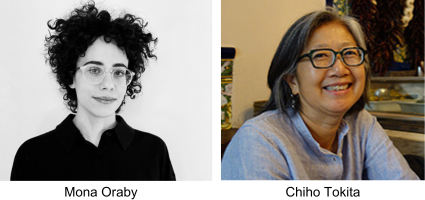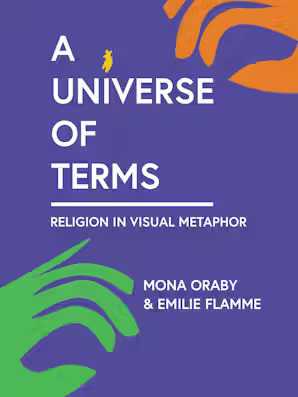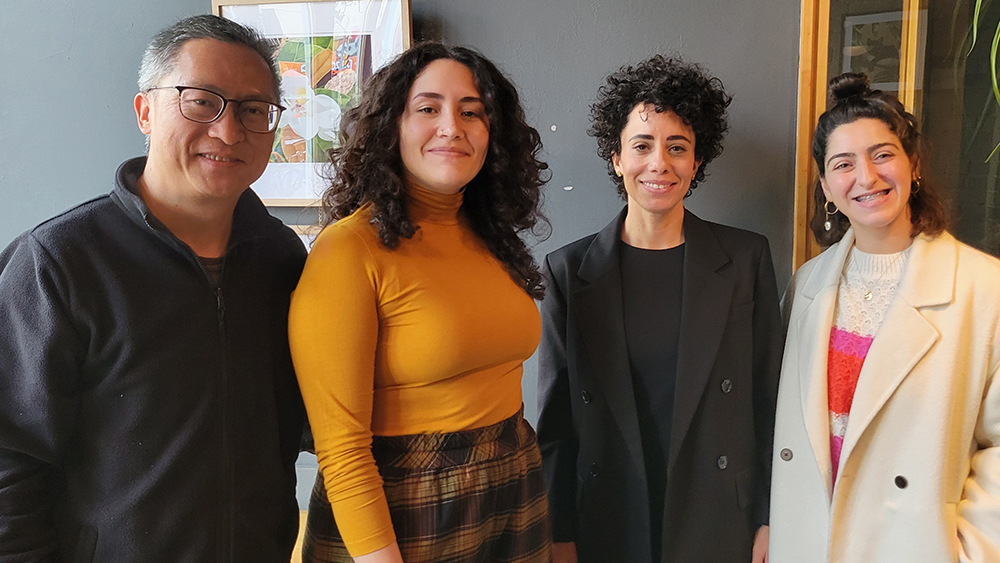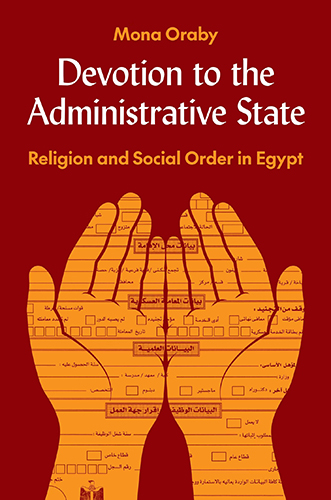← Back to 2024 December Roundup Newsletter Contents

 The new DSR Lecture Series presented its first event in November 2024, with Mona Oraby speaking about her new book, Devotion to the Administrative State: Religion and Social Order in Egypt (Princeton University Press, 2024).
The new DSR Lecture Series presented its first event in November 2024, with Mona Oraby speaking about her new book, Devotion to the Administrative State: Religion and Social Order in Egypt (Princeton University Press, 2024).
Oraby is an associate professor of political science at Howard University and has served since 2017 as the editor of The Immanent Frame, a digital publication of the Social Science Research Council that advances scholarly debate on secularism, religion, and the public sphere.
She is also the co-author of A Universe of Terms: Religion in Visual Metaphor (Indiana University Press, 2022).
Oraby sat down with Chiho Tokita, a doctoral student at the DSR, for an interview that centered on Oraby’s intellectual history, her two books, and her current project. The interview has been shortened and edited for clarity.
Can you share a bit about your academic journey toward a PhD in political science?
In my undergraduate experience, the faculty who shaped me most formatively were located in political science. They introduced me to a series of texts and into a way of thinking about the world that was expansive and creative. I gravitated toward the discipline as offering conceptual frameworks that resonated with me. It was soon after 9/11 and the US invasion and occupation of Iraq and to be a student of political theory at that time was transformative. I didn’t know what it meant to be a professional political scientist until I got to graduate school.
What drew you toward the intersections of law, religion, and politics where your book Devotion to the Administrative State sits? And what are some of the debates you were intervening in?
My intellectual trajectory is one propelled foremost by puzzles. In the years leading to the writing and publication of Devotion to the Administrative State, I read extensively in an interdisciplinary scholarship that made a significant and at the time compelling case for thinking about state regulation as having pernicious effects on religious flourishing in the modern and contemporary world. So, it was puzzling to me that minority communities in Egypt and elsewhere sought recognition of their religious difference from the state even though they would continue to be marginalized on the basis of that recognition.
The existing explanations for this behavior — for example, that they don’t know what they are doing or understand the consequences of their actions, or that they must participate in their marginalization to exist as subjects, or that political secularism has become so entrenched that we cannot think outside or beyond the secular — were insufficient ways to think about the desire for state recognition. My research revealed that attachment was more salient for my interlocutors than equality. When members of a minority community seek recognition from the state, they are not seeking to be equal to all others, but to pursue attachments that are meaningful to them, ones based in the difference of their status from other minority groups and the Muslim majority. This shows the deep significance of state recognition for their own sense of religious belonging. They are fully aware that recognition of their difference by the state will result in a subordinate legal status to Muslims, and they assent to the state’s authority to make these determinations.
Rather than encountering a discourse of equality, I saw the salience, ubiquity, and preference for religious difference in Egypt. There, the category of religion is not only compulsory but appears on nearly every document that substantiates legal personhood, from birth to death. This category (religion) is largely uncontroversial in Egyptian society. For scholars of religion, who are trained to be suspicious of the category of religion, I hope the book will illuminate how and why this category is understood to be necessary and uncontroversial in some places in the world.
How did the idea for a nontextual approach to religion come about? What were the concerns animating A Universe of Terms?
 This is a book I coauthored with illustrator Emilie Flamme, and it emerged from a place of play. Both of us are huge fans of graphic novels and graphic memoirs. We both read comics. We both think quite broadly with and about modes of knowledge production and circulation. We wanted to think visually about alternative modes of scholarly communication.
This is a book I coauthored with illustrator Emilie Flamme, and it emerged from a place of play. Both of us are huge fans of graphic novels and graphic memoirs. We both read comics. We both think quite broadly with and about modes of knowledge production and circulation. We wanted to think visually about alternative modes of scholarly communication.
The idea to publish a book based on a digital project hosted on The Immanent Frame came to fruition during the COVID-19 pandemic, when for necessary reasons social connectedness was curtailed. At the same time Americans were protesting the legacies of racial oppression and the state of climate catastrophe reached a momentous and quite dire level. We gave ourselves permission through this book project to cultivate a space for experimentation and collaboration, and for both of us it was an anchor for the possibility of joy.
There are a great number of scholars who I admire and whose work I turn to often who have made careers out of studying a particular site, topic, or question for decades and publishing in the top journals of their field and in prestigious university presses. For me, A Universe of Terms isn’t an indictment of these traditional modes of scholarship. In my ideal world, A Universe of Terms opens up space for more experimentation in scholarly publishing and for both the process and the product of that experimentation to count as scholarship. Emilie and I were very deliberate in deciding to publish our book with a university press. We committed to the peer review process and to incorporating feedback from the reviewers, and to working with an editor and with senior scholars.
How do you see the relation of scholarship and play?
I could imagine some different trajectory where the book would have been preceded by a scholarly article making the argument for play. Rather than writing about play, we published our playfulness. A Universe of Terms models one possibility for what that might look like.
What are you working on now?
I am currently working on Fictions of Disgust: Classification and the Human in Contemporary Literature. My hope is that this book will make a methodological contribution by demonstrating how literary fiction, particularly novels, can be read anthropologically to shed light on what makes us human across time and place.
Why choose the title Fictions of Disgust?
My argument is that disgust and a related emotion, contempt, attune us to ethical questions in ordinary life. If fieldwork is the hallmark method of anthropology, I’m offering a view of literary worlds as proper objects, and literary figures as proper subjects, for anthropological reflection.
Professor Oraby, thank you so much for your time and generosity. It has been such a privilege to learn about your intellectual process and the questions that animate your research. We are also appreciative of the opportunity that other graduate students had to meet with you during your visit to the DSR.




